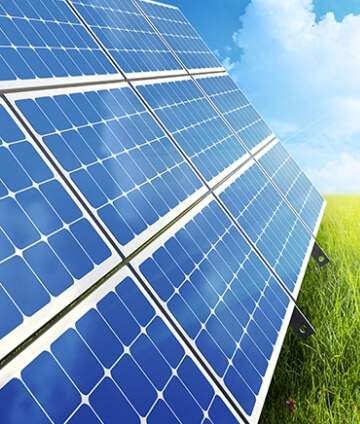-
Residential
Everything we do is for the benefit our members. We’re proud to provide a wide variety of products and services for your home, helping you save time, money and energy.
-
Business
Everything we do is for the benefit our members. We’re proud to provide a wide variety of products and services for your business, helping you save time, money and energy.
-
Contractors
Contractors
We’re dedicated to helping our members make smart energy usage decisions. We offer many informational and educational resources, programs and incentives, and energy-efficiency rebates for both business and residential members.
-
Clean Energy & EVs
Clean Energy & EVs
As part of our strategic initiatives, we are committed to environmental leadership. Pursuing renewable energy alternatives and giving members the choice to support those initiatives is the right thing to do. With a wide variety of commercial and residential programs, we will partner with you in your efforts to go green, whether at home or at work.
-
Company
Based in Ramsey, Minnesota, Connexus Energy is Minnesota’s largest consumer-owned electric cooperative, providing electricity and related products to member residents and businesses. The Connexus Energy Board of Directors, elected by our membership, governs the electric cooperative. We serve more than 146,000 members in portions of Anoka, Chisago, Hennepin, Isanti, Mille Lacs, Ramsey, Sherburne and Washington counties.
- Residential
- Business
- Contractors
- Clean Energy & EVs
-
Company
- About Us
- The Connexus Energy Foundation
- Safety
- Careers
- News Center
- Connexus Newsroom
- Newsletters
- Events
- Modern Heating with Electricity
- Anoka Halloween Grande Day Parade
- Board of Director Candidate Application Portal Opens
- Board of Director Candidate Application Portal Closes
- Annual Connexus Energy Legislative Forum
- Annual Meeting
- Grid Innovation & Community Resilience: Minnesota's Clean Energy Pathways
- Andover Area Damage Prevention Meeting
- Sponsored Event: Northern Stars Celebration
- Sponsored Event: Fiesta Gala
- Sponsored Event: Hope Gala Masquerade Ball
- Connect the Dots - Where Education Meets Industry
- Connexus Energy Board of Directors Meeting
- Connexus Energy Board of Directors Meeting
- Connexus Energy Board of Directors Meeting
- Connexus Energy Board of Directors Meeting
- Connexus Energy Board of Directors Meeting
- Connexus Energy Board of Directors Meeting
- Connexus Energy Board of Directors Meeting
- Connexus Energy Board of Directors Meeting
- Connexus Energy Board of Directors Meeting
- Connexus Energy Board of Directors Meeting
- Ramsey Business Expo
- Sponsored Event: Real Stories Gala for Stepping Stone
- Sponsored Event: Achieve Services Spring Gala
- Sponsored Event: Hope-4-Youth Gala
- Sponsored Event: 15 Annual 5K Walk for Mental Wellness
- CATAN Solar Solstice Celebration
- Sponsored Event: ATV Big Air Tour Live Shows
- Sponsored Event: ATV Big Air Tour Live Shows
- SPONSORED EVENT: 2024 Isanti MN Firefighters Rodeo
- Sponsored Event: Isanti County Fair
- Sponsored Event: Rhythm of the Rapids
- Sponsored Event: Trott Brook Benefit Bash
- Sponsored Event: Alexandra House Hope Fest
- Sponsored Event: Ramsey Happy Days
- Sponsored Event: Coon Rapids Rotary Sampler '24 - Octoberfest
- Sponsored Event: Taste of Asia
- Sponsored Event: Walk & Roll Jam HOPE Fundraiser
- Connexus Energy Board of Directors Meeting
- Connexus Energy Board of Directors Meeting
- Connexus Energy Board of Directors Meeting
- Connexus Energy Annual Meeting
- Connexus Energy Board of Directors Meeting
- Connexus Energy Board of Directors Meeting
- Connexus Energy Board of Directors Meeting
- Connexus Energy Board of Directors Meeting
- Connexus Energy Board of Directors Meeting
- Connexus Energy Board of Directors Meeting
- Connexus Energy Board of Directors Meeting
- Connexus Energy Board of Directors Meeting
- Sponsored Event: North 65 Chamber of Commerce Chamber Awards Gala
- Media Contacts
- Top 5 Highlights
- Connexus Newsroom
- Economic Development

Solar Interconnection Process
Interconnecting your DER with Connexus Energy’s Distribution System
State of Minnesota interconnection process
Connexus has adopted rules developed by the State of Minnesota pertaining to the interconnection of Distributed Energy Resource (DER) to the electrical distribution system. It is required that the process be followed for any interconnection of a DER to the electrical distribution system.
A DER is any device or system that either generates or stores electrical energy that is interconnected to the utility electrical distribution system. DER technologies can include photovoltaic solar systems, wind turbines, energy storage batteries, or diesel generators, and are not limited to renewable technologies.
The process and associated documents are established based on the size (rating) of the DER system and type of interconnection. The overview process document provides a comprehensive explanation of the interconnection process and requirements across all sizes of interconnections, up to 10 MW in size.
Interconnection process and associated documents are set up into process tracks based on DER size, as listed below. An explanation of interconnection process specific to each track is listed along with the track. Click on the link to access the process document.
Table of interconnection tracks based on DER size
Process Track |
DER Capacity Size |
Process Overview Document |
| Simplified | Up to 20 kW | Simplified Process |
| Fast Track | Over 20 kW up to 4 MW (4,000kW) | Fast Track Process |
| Study | Up to 10 MW | Study Process |
Under 40 kW
Given the very wide range of DER size covered by the Fast Track process, the process to follow and documents to use for net metering applications of systems less than 40 kW is referenced below – Net metering interconnections.
Net metering is interconnection of DER where the utility will compensate the interconnected customer for any excess generation produced above what is used by the customer. The utility will purchase the excess energy at rates in accordance with current tariffs. More information about net metering can be found at the MN PUC website.
Net metering interconnections under 40 kW
Interconnections 40 kW and larger
Energy storage interconnection
The Energy Storage Application must be completed and submitted for all energy storage DER interconnections in addition to the Simplified or Standard Interconnection Applications, whichever is applicable to the DER size.
Interconnection technical requirements
The Cooperative Minnesota Technical Interconnection and Interoperability Requirements (TIIR) specifies technical requirements applicable to the full range of sizes and types of DER facilities to be interconnected. The Connexus Technical Specification Manual (TSM) is to be used in conjunction with the TIIR and identifies technical requirements and guidelines specific to Connexus Energy.
Rate schedules
Submitting an interconnection application
Interconnection applications, including all attachments and supporting documents (listed below), may be submitted electronically to: [email protected]
- Application
- Site Map
- One-line Diagram
- Labels Page
- Manufacturer Specifications
- Homeowner’s Insurance
Application fees will be deducted from the interconnection members utility account upon receipt of application.
Supplemental review and equipment upgrade fees will be paid online by credit card or through US Mail via check to the address below:
Connexus Energy, C/O DER Interconnection Coordinator, 14601 Ramsey Blvd. NW, Ramsey, MN 55303
Contact information
Submit all interconnection applications and any subsequent documentation via email to: [email protected]
If you have any specific questions you need assistance with, please contact by email, call, or text: [email protected] or 763.691.8981
If the existing meter seal must be cut for access service wiring or removal of the meter as part of the installation, the electrician or project manager must call 763.323.2650 for notification prior to cutting the seal.
If you need to have power disconnected to accommodate installation, please call our scheduling department at 763.323.4215 in advance to schedule a crew for the disconnect.
Frequently asked questions
How is the system size determined?
Total system size is based on the total aggregate nameplate capacity ratings of all elements of the DER system that will be generating or discharging power. For renewable energy sources such as solar generation, this would be the AC power rating of the inverter or sum of ratings of multiple inverters. See page 19 "Nameplate Rating" in Overview Process for detail.
Do panels work with snow on them?
Anything that impedes sunlight reaching the elements internal to solar panels will hinder generation. A cloudy sky, fog, and rain will significantly reduce solar generation, but may not totally prevent it. Snow or ice directly on the panels will significantly reduce solar generation, and if completely snow or ice covered, likely completely impede generation.
How much does solar cost?
Connexus will not publish cost of solar because we do not sell or market solar generation and pricing can vary between suppliers. You may call one of our Member Service Specialists to discuss what we see as trends, however contact a solar energy supplier for actual pricing.
Will you buy back my excess electricity?
Connexus will buy back excess energy generated by renewable energy systems that is not consumed for systems less than 40 kW in size. See Connexus Energy rates for available rates. This does not include energy storage that is discharged by an energy storage system.
Do I need to have it inspected?
Your DER system must be inspected and approved by a Minnesota licensed electrical inspector and final on-site inspection by Connexus Energy, prior to being provided approval to operate. This applies for all systems interconnected to the distribution system, either behind the service meter or grid connected, and whether completed by a home or business owner or a hired contractor.
Am I limited in system size by how much electricity I use?
Not if the system is net metering sized less than 40 kW. The system size must be less than 40 kW nameplate, and must produce less than 40 kW of AC power.
What are the federal tax credits?
In December 2020, Congress passed an extension of the ITC, which provides a 26% tax credit for systems installed in 2020-2022, and 22% for systems installed in 2023. (Systems installed before December 31, 2019 were eligible for a 30% tax credit.) The tax credit expires starting in 2024 unless Congress renews it.
Will I still have an electrical bill?
The power produced by a member-owned solar system will offset power they would otherwise purchase from Connexus. If the system produces more power than the member consumes, Connexus will provide net energy credit for excess kilowatt-hour (kWh) generation. Depending on the Net Metering rate schedule elected by the member in the DER Interconnection Agreement, Connexus will either purchase the excess kWh generation or add roll-over kWh credits to the account.
Members with solar systems still have charges on their bill that offset the net energy credit, such as the cost of basic service, energy usage, net metering grid access charge, and taxes.
It is the responsibility of the member and contractor to determine the optimal solar system nameplate capacity to fit the member’s needs.
Can I install it myself?
Yes. Connexus does not require the applicant to contract with a supplier to install the system. However, the applicant is still required to follow the interconnection process starting with the application and approval, and must have the completed system pass inspection by a State of Minnesota qualified electrical inspector, and final inspection and witness test by Connexus.
Why is there a grid access fee?
The grid access fee is a means of all members pay equal share of use of the grid and avoid cross subsidization of fixed costs.
How do you read what excess electricity my system produces?
Connexus will install a bi-directional meter that will measure and record the energy you consume and the excess you export to the grid, on two separate registers. Once a month we will read these registers remotely, and use those readings to calculate your bill.
Do I need a production meter?
Connexus does not require a production meter. A production meter may certainly be installed, however since it is not required by Connexus, it must be provided by the applicant or applicant’s contractor.
Can my contractor or electrician cut the meter seal and remove the Connexus Energy meter if needed to complete wiring and installation of my solar or storage system?
If the existing meter seal must be cut to access service wiring or remove the meter as part of the installation, the electrician or project manager must call Connexus at 763.323.2650 prior to cutting the seal to avoid being assessed a fee.
I am installing a generator at my home to serve as an emergency power source. Do I need to go through the interconnection process?
No. However, there are still technical requirements that must be applied and adhered to for interconnecting an emergency generator to building wiring. Please see the following for requirements: Emergency Generator - Open Transition Switch Requirements
Do you have information/websites to learn about solar?
The following are a few solar resource links. This is not an exhaustive list of what may be available on line or from other sources.
Should broken or old solar panels be thrown away or recycled?
Most homeowners have a warranty or contract for their solar panels. If the panels fall under the warranty (usually 25 years), then it’s the responsibility of the installer or the manufacturer to recycle the solar panels properly. Check your warranty or contract for responsibility, if applicable.
Why don't you offer rebates for on-site solar?
We support members who make the choice to install self-generating solar systems by offering incentives for the application fee (paid during the application process and refunded after the system is commissioned).
Which residential programs are not eligible with Net Metering?
Peak-Time Rebate, Whole House Time-of-Day, or Budget Billing programs are not eligible with Net Metering. If a member is currently enrolled, those programs will be removed when the DER interconnection is commissioned, upon activation of the new Net Metering rate.
your most powerful membership®
These four words focus on the most important component of our cooperative: our members. In a cooperative, everything we do is for the benefit of our membership. This vision provides daily inspiration to build powerful partnerships with our members.

Contact Connexus Energy
Get in touch with Connexus Energy. Call, email, stop in, or fill a form with your questions and feedback.




